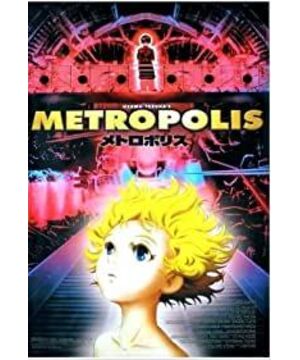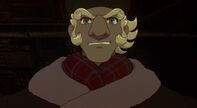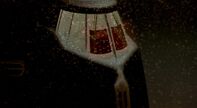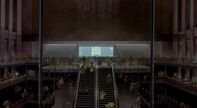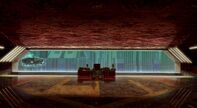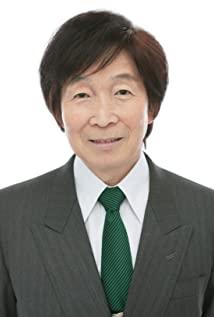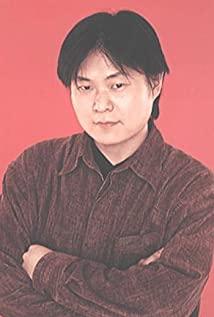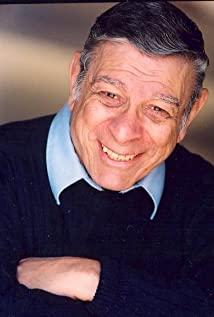Like the sound of the building leaning forward, fantasy will eventually become reality.
The main line of the film tells the story of a capitalist who tried their best to build the most powerful machine, and was finally destroyed by man-made robots. Discusses the world in which capitalism develops to the end, when a small number of people control most of the wealth, people's desires continue to expand, and they want to conquer the world by building the Tower of Babel and using man-made robots. But in the end, it was devoured by the works he created. This may be a manifestation of the law of causality, and it is also a metaphor for the story of the Tower of Babel in the Bible. "Man's infinitely amplified desire will eventually lead to the demise of the self" is also a kind of human Wake up. But in fact, there is such a voice when encountering new technologies in every era. People must be afraid of the unknown. This is human instinct to warn us of the danger approaching. When we think about the "alienation" of capitalists' desires caused by the continuous expansion of capital, we do not know where the bottom line is, and this film does not answer this question for us. At various forks in human history, there are so many possibilities of what if, since you click the wrong skill tree, you can only go one way to the dark. As for the future of technology, no one can know, who knows the next love Is Einstein not yet born, or has been born.
The discussion of the main thread ends here.
There are many sub-lines, let's start with the story of Tima and Kento. The theme of the story of Tima and Kento is actually the question of whether robots have souls. It is clear in the film that there are many times in the film where the characters ask Tima, are you really not human, and Tima, who is a robot, firmly believes that she is a human being. It wasn't until he was finally "alienated" by the wire that he had doubts about himself.
Whether or not a robot has a soul is a cliché, and Ghost in the Shell and Blade Runner are all based on it.
As a highly self-consistent individual, can a robot create a soul through the activities of mechanical parts? The major of "Ghost in the Shell" Motoko Kusanagi, and "Blade Runner" Rick, Rachel, the leader of the rebel army... Can you say that they are not alive? Are they soulless dead things? The question of whether robots have souls will continue to be a hot topic. With the continuous development of technology, the imagination that only exists in the works will eventually become a question of reality. If we admit that they have souls, then we have to face the problem of how humans and robots get along. Behind this question is a question about the nature of human nature. Is the nature of human nature oppressing others to achieve self-satisfaction? Is it conquest, is it the satisfaction of desire? Or the pursuit of metaphysical spiritual satisfaction? If not conquering, not oppressing others, why do human beings fight each other? World War I and World War II have not yet been forgotten, and the shadows of the dark past are still swaying before our eyes.
Tima's father-like relationship with healthy people is also worth talking about. Will robots depend on their creators, humans, as their parents have been since children? If not, where do they belong? Still don't belong? Since we can't use human thinking to think about their actions, how can human beings get along with them? Are we creating friends, or are we demons?
Another sideline that I find interesting is the Duke's relationship with his son Locke. Ignore the distorted father-son relationship between them first, from the perspective of superiors and subordinates, the Duke is the representative of the government, and the government's governing policy is to oppress robots (there is no actual governance scene in the movie, but it can be seen from the background that he created oppression The social environment of robots), denigrated the status of robots in society, and made people believe that the status of robots is lower than that of humans, and it is impossible to surpass human intelligence, so Locke is so obsessed with preventing the Duke from letting Tima ascend the throne, so Do not hesitate to hunt down innocent Tima and Kento.
But as the head of the government, the duke spent a lot of money to create Dima and let it rule the world.
After watching the end of Metropolis Destruction, Locke's insistence is obviously correct, but we know that he is not a prophet, just a people influenced by culture and fooled by the government. The Duke insisted on using robots, but Locke's ideas ran counter to him, but Locke's ideas were influenced by the government headed by the Duke, so what went wrong? The truth belongs to no one, and the duke who fools people is fooled at the same time. Where is the truth? Or is there no truth at all? Another side line about the Revolutionary Army is also very interesting. As the leader of the revolutionary army of the proletariat, he colluded with the head of the government, the president who was not dead at that time. This revolution became ridiculous. In the end, the revolutionary army was just a knife that the president's men swung at the duke, not really for the happiness of the people. and fighting warriors. In the play, because of the collusion between the duke and the army, the revolution failed, and this ending was foreshadowed by the words of the leader of the revolutionary army: "I want to die like a revolutionary fighter." In the eyes of the public, he is really a revolutionary The identity of a soldier died, but in fact he did not die for a great cause, but only died as a revolutionary soldier, which is particularly ironic.
The analysis ends here, one thing to say, Tima is really cute.
View more about Metropolis reviews


